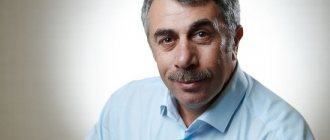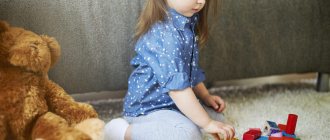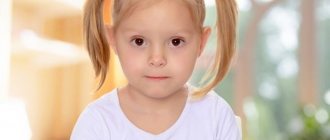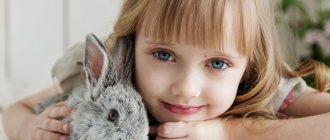A child does not speak at 2 years old: causes, symptoms, is it worth contacting a neurologist? The child does not speak at the age of 2 years. Normally, upon reaching this age, the baby should actively communicate with parents and loved ones, otherwise this may be a sign of SPD
From the first days of a child’s life, the most important component of human life begins to form – SPEECH. The ability to speak and understand the speech of other people is inextricably linked with processes such as memory, attention, and thinking. Only with the help of speech can a person fully exist and harmoniously join the society of other people. Therefore, it is extremely important for parents to know the basic norms of speech development in children and the symptoms that may signal certain deviations in order to begin treatment on time and prevent serious problems in the child’s health in the future.
Norms of speech development
Let's look at the basic norms of speech development in children. Many parents believe that before their child speaks his first words (often around the age of about a year), it is useless to talk to him, since he still does not understand anything and cannot yet learn anything. But this is an extremely erroneous opinion, because speech development begins from the first days of a baby’s life.
The first stage of this process is screaming . While the baby was in the mother's belly, all his needs were satisfied instantly. But, finding himself in a completely different environment, he needs to find a way to somehow express himself and give a signal that his needs are not satisfied (wet, want to eat or sleep, sad, etc.). That is, a cry becomes a signal of discomfort at the level of an unconditioned reflex.
The second stage is humming . It usually occurs at the age of one to two months and accompanies the child in the first six months of life. These are different variations of sounds: a-a-gu, gee-s, ge-e, a-gy, etc. With the appearance of a significant adult, the child’s chatter becomes much more active, he looks into your eyes, waits for your answer and is already trying to build a full-fledged verbal dialogue. It is very important to maintain this “dialogue” and talk with the child as much as possible.
Babbling is the third stage of speech development. A child begins to babble at approximately 6-7 months of age. The baby begins to pronounce individual syllables “ba”, “ma”, “ta”, etc. - at first once, very rarely and as if by accident. Gradually, syllables are heard in his speech more and more often, they are repeated in the form of chains: ba-ba-ba-ba, ma-ma-ma-ma.
The stage of first words begins at 11-12 months of a child’s life. He begins to associate words with objects in the environment, words are filled with meaning for him. By this time, the child has already formed an active (from 3 to 10 spoken words) and passive (up to 20 understood words) vocabulary. By the age of 1.5 years, the vocabulary increases to 40-70 words, and at 2 years the baby already uses from 150 to 300 words. The child begins to speak in sentences. At first they consist of two words (mama give, lalya boo, etc.), and then of three or four.
It is always worth understanding that each child develops individually, and if there are short-term delays in passing the stages of speech development, this is not yet a sign of deviations. But, if the delays are quite long or some stages of development are completely absent, this is a significant reason to contact a specialist.
When you can't wait
Parents should closely monitor their child's development. Undoubtedly, there are so-called variants of the norm and some deviations from the classical tables are quite possible. However, there are a number of signs that should give you concern:
- A four-month-old baby does not respond to the appearance of adults. Doesn't smile when seeing loved ones. No partying.
- By 6-7 months, babbling and repeated syllables meaning a specific word - “ta-ta-ta”, “na-na-na” and others – did not appear.
- At one and a half years old, the baby still does not even say simple words like “mom”, “dad”, “give”. Doesn’t understand simple requests like “come to me”, “bring a teddy bear”.
- At 2 years old, his vocabulary consists of only a few simple words.
- By the age of 2.5 years, the vocabulary is no more than 20 words and the child does not make sentences from them.
- By the age of 3, the child does not understand simple explanations and does not know the names of body parts.
- At 3 years of age, a speech pathologist expects to hear at least 1000-1500 different words and speech consisting of complex sentences. If the baby does not demonstrate this, then it makes sense to consult a specialist.
It happens that a child speaks, but in his own language. Undoubtedly, at this age he has the right to “bo-bo” and “woof-woof” instead of a dog, and even to some incomprehensible word that means something completely different in sound. However, such words should not constitute his entire vocabulary. If a 3-year-old child is understood only by his mother, this is also a reason to turn to specialists.
Why may a child not speak at 2 years old?
Normally, upon reaching the age of two, the baby should actively communicate with parents and loved ones, call a spade a spade, and tell various stories. But it happens that a child at 2 years old does not yet utter any words or does it very poorly. The reasons for this may be:
- No need for speech . This can happen in two opposite situations. Firstly, when parents hardly talk to the child, he spends a lot of time in front of the TV or computer - there is simply no one to communicate with. Secondly, when parents try to say everything for the child, predict his desires by gestures and sounds, formulate simple questions that can be answered “yes/no” - then the baby simply has no need to engage in communication.
- Hereditary diseases that are accompanied by speech development delay (SSD)
- The nature of the speech of parents and the environment . If the speech of the adults around the child is fluent, fast, and unclear, then the children are not able to repeat all this.
- Difficult labor (rapid, with entanglement of the umbilical cord) or trauma to the child during birth (trauma to the cervical spine and/or central nervous system) can also lead to delayed speech development in the child
- Severe infections and traumas (psycho-emotional traumas as well) suffered by the child at an early age, which negatively affected the overall development of speech in the child. It is also important to understand that delayed speech development can be an accompanying symptom of more serious diseases, such as cerebral palsy, epilepsy or congenital abnormalities of the central nervous system.
Delayed psycho-speech development
Delayed psycho-speech development (DSRD) is the consequences of deviations in the development of the central nervous system and brain, which manifest themselves in the form of disturbances in the rate of mental development of the child (his memory, attention, speech, thinking, emotional-volitional sphere).
Delayed psycho-speech development is often diagnosed at the age of 2-3 years, although the first signs can be detected as early as 4 months. But the later the diagnosis of SPR is made, the more difficult it will be to get rid of it in the future.
There are very important signs of the presence of SPD that parents can detect on their own. Children experience increased salivation, often have a slightly open mouth, they are unemotional or, conversely, hyperactive and aggressive, and are poorly developed physically. Key symptoms indicating possible PVD are:
- 4 months - the child does not respond to your words and gestures, does not smile.
- 8-9 months - the child does not babble.
- 1 year - the child practically does not make any sounds, and by 1.5 years he does not say the simple words “mother”, “give”, and does not understand speech addressed to him.
- 2 years - does not repeat new words, uses very few words in his speech.
- 2.5 years - uses only about 20 words, does not understand the names of body parts, objects, cannot form a simple phrase.
- 3 years - the child cannot repeat a phrase after an adult or form an easy sentence, speaks too slowly, or vice versa quickly, “swallowing” their endings.
If you notice similar symptoms in your child, do not let the situation take its course - contact a pediatric neurologist as soon as possible to establish a specific diagnosis. The earlier the child’s age, the greater the chances for a successful comprehensive recovery and proper development of the child in the future.
Delayed speech development of a child. Signs, symptoms and who to contact.
September 15, 2016
Speech begins to form long before the first words appear. Researchers of child speech establish significant periods in a child’s life (from approximately 0 to 14-16 months), which are called pre-speech and pre-speech periods. They are extremely important for the child’s further own speech and language development, since it is at this time that all his basic psychological and mental processes are formed.
The head of the speech therapy consultative and diagnostic service of the educational complex of State Budgetary Educational Institution Secondary School No. 875 in Moscow, speech therapist Osteopolyclinic, myofunctional therapist, developmental psychologist, candidate of psychological sciences Yulia Aleksandrovna Tisovskaya (Yulia Aleksandrovna graduated from Moscow State Pedagogical University named after Lenin, 20 years old) talks about the problems of delayed speech development in children works with children with severe speech impairments).
Speech is the highest mental function, therefore the period of intrauterine development of the child is also important. Often, perinatal developmental pathology is diagnosed too late (after 3 years), when the consequences of these disorders become obvious. The pre-speech and pre-speech periods are indicators of how speech will develop.
You need to contact a speech therapist if:
- there was intrauterine growth restriction
- hypoxia
- long stay in intensive care
- feeding through a tube in the first days or months of life
- CCH (craniocerebral hypothermia) at birth
- visual impairment
- hearing impairment
- genetic syndromes
- increased intracranial pressure (hydrocephalus)
- birth injury
P signs and symptoms , which together should alert and attract attention, but it should be borne in mind that if there are only 1 - 2 symptoms, we can only talk about the baby’s character and his characteristics, and not developmental disorders .
Ages 0 to 1.5 years
- by three months, the “revival complex” has NOT appeared - the child’s emotional reaction to an adult (the child, seeing his mother, squeals joyfully, moves his legs, throws up his arms, makes vocal reactions)
- humming (soft vocalization) appeared NOT at 2-3 months, but later; periods of humming are rare, sounds are quiet, monotonous, breathing is quickly exhausted, there is hoarseness of the voice
- the transition to babbling (multiple repetition of chains of syllables) occurred later than expected (normally, the period of babbling lasts from 5-6 to 12 months); • by the end of the first year of life, common words did NOT appear (“mom”, “dad”, “baba”, “give”, etc.)
- at the age of 7-8 months and later does NOT understand the meaning of individual words (mom, dad, names of surrounding household objects, toys, etc.), DOES NOT understand the meaning of simple requests (“Give mom a pen”, “Show your nose, eyes” and etc.)
- the child does NOT imitate the actions of adults (with toys, household items), does NOT repeat individual words after adults
- The child has difficulty developing basic chewing and swallowing skills. For example, if a one and a half year old child cannot chew and chokes even on a piece of apple
- If a child of any age has a constantly open mouth or increased salivation for no obvious reason (not related to tooth growth)
Ages 1.5 to 2.5 years
- the child actively reacts to the sound of the TV on, but does not respond at all to spoken speech
- does not respond to his name
- there is no pointing gesture (does not point with a finger)
- no motor imitation (does not repeat movements after parents)
- no articulatory imitation, onomatopoeia, does not address family, or repeats after you or cartoon characters, but does not use these words when communicating (echolalia)
- does not perceive your questions by ear, answers correctly only based on your articulation (watches your lips and your pronunciation)
- does not follow basic instructions (bring the ball, give it, on, etc.)
- looks away and does not follow the adult’s emotions
- does what he can with your hand (for example, takes mom’s hand and opens the door with it, takes a mug, turns on the TV, turns off the light)
- fear of new premises, changing the route of a walk, new faces (hysteria if you decide to go along a different street)
- stereotypical and repetitive nature of the game (may open and close doors for a very long time every day, knock on certain objects until you interrupt it, lining up objects in a row)
- Stereotyped and repetitive motor movements (shaking or clapping of hands or fingers, or complex body movements). For example, with strong excitement (joy, sadness), he begins to wave his arms like wings, very often walks on tiptoe
- does not express interest when seeing children, does not pay attention to them and does not play
- at 2 years old the child uses only a few individual words and does not try to repeat new words
- at 2 years of age, the active vocabulary is less than 20 words and phrases. Does not know the names of surrounding objects and body parts: cannot, upon request, point to a familiar object or bring something out of sight. If at this age he cannot form two-word phrases (for example, “give me some water”)
Ages 2.5 to 3 years and older
- He speaks so incomprehensibly that even his family has difficulty understanding him. Does not speak simple sentences (subject, predicate, object), does not understand simple explanations or stories about events in the past or future
- the child “rattles”, speaks too quickly or extremely slowly, swallows the endings of words, stretching them out, although there is no example of such speech at home
- speaks mostly in phrases from cartoons and books, does not construct his own sentences - this is a sign of a serious developmental disorder
- mirrors what adults say in front of him, even out of place - this is the reason for an urgent visit to a specialist, and a psychiatrist at that!
- the mouth is constantly open or there is increased salivation for no obvious reason (not related to tooth growth)
Unfortunately, most parents often do not pay due attention to these symptoms and only difficulties in communication that arise in the future, and non-compliance with age development norms of 2.5 - 3.5 years, force them to pay attention to problems in the child’s development. For some reason, many specialists in clinics still send mothers and children to wait for 3 years and do not make any specific diagnoses, when in turn mothers complain that the child at 1.5 - 2 years old does not speak, does not understand spoken speech well, does not respond to his name , doesn’t point fingers, doesn’t make eye contact, doesn’t follow basic instructions, isn’t interested in toys? Three years is considered the optimal age, when approximately all children have developed a vocabulary and have an understanding of themselves in this world. Before this age, some develop faster, some slower.
But why, knowing about such complex diagnoses as early childhood autism, sensory and motor alalia, autism spectrum disorders, speech and mental development delays, sensory hearing loss, is it important to prevent and correct these disorders - therefore, a visit to a speech therapist in the first years of a child’s life is a necessary event. It is important to use a timely, comprehensive approach to correct speech impairment and understanding of spoken speech, which is aimed at speech activity, non-verbal higher mental functions and the emotional and personal side of children’s development at the very first stages of the problem.
SURVEY
What should you do if you find that your child has the behavioral characteristics that we have discussed, such as lack of speech, eye contact, pointing, understanding of addressed speech, joint activities, reaction to his name, etc.? We take the second Step: Survey.
Pediatric neurologist and EEG
Contact a pediatric neurologist; for many, the best option is a specialist in the neurological department of a children's hospital or specialized center. If you are told to “wait until 3 years”, look for another doctor who will prescribe a daytime or nighttime EEG (an overnight study allows you to exclude epileptic and convulsive readiness, which may not manifest itself in the form of seizures, but slow down the baby’s development), and recommend contacting an audiologist , undergo CVEP and audiometry.
Remember - there are many diagnoses and what can help with alalia can harm with sensorineural hearing loss or autism, which means the approach to each child must be individual.
Audiologist
Even a slight decrease in a child’s hearing can negatively affect speech development. Hearing impairment can be either temporary or permanent.
There are cases when one of the ears hears poorly, overall audibility is reduced, or the child cannot distinguish between certain frequencies - he hears loud and quiet ones, but not the middle ones. Because of this, the child perceives surrounding sounds as if he were under water. At the same time, he can react absolutely correctly when the TV is turned on and completely ignore your speech. Also, sometimes hearing loss occurs after the baby has learned to speak.
A child with undetected hearing loss will not be able to develop speech, language skills, and cognitive abilities properly and will show signs of delayed mental and speech development. The delay may be irreversible and the child will need to attend a specialized school. In medical practice, there are cases when a child with congenital hearing loss was diagnosed with mental retardation.
Many maternity hospitals use otoacoustic emissions, which provide information about whether the hair cells involved in sound transmission are working. But the positive result of this study does not yet provide a 100% guarantee that the child’s hearing is fine, because sound transmission requires the work of several parts.
Computerized audiometry may be needed - SSEP (short-latency auditory evoked potentials) - this is a study of the response of the brain stem and auditory nerve to sounds. KSEP is used to diagnose hearing disorders in both children and adults, but they are of particular importance in children, especially those of prelingual age. It is produced using sensors attached to the head. Allows you to determine not only the presence/absence of pathological abnormalities, but also the location of their localization. In most regions it is carried out while the baby is sleeping.
Basic recommendations of a defectologist for children from one to 2 years of age:
- formation and development of understanding of addressed speech (speak clearly, use situations that encourage simple actions: give, bring, look, etc.)
- formation and development of visual memory and concentration (the presence of a TV and, as a consequence, a constant background noise and passive reception of information interfere with the development of speech)
- formation and development of thinking (training the skill of obtaining information from books (audio tales) and stimulating role-playing games. That is, read, read and read, despite the fact that your child closes the book and does not sit still)
- formation and development of speech skills (actively use situations that encourage the pronunciation of simple words: na, yes, no, etc.)
- development of communicative communication (communication with peers)
The article is located in the sections: REHABILITATION AND RESTORATION, Speech Therapy and Defectology
Treatment and correction of speech delay
The Bersenev Medical Center provides comprehensive treatment for delayed psycho-speech development in children. The clinic’s specialists draw up an individual program for the treatment and correction of mental retardation for each individual child. The program includes a set of rehabilitation activities carried out by a pediatric neurologist, massage therapist and speech therapist. A psychologist, a reflexologist and, of course, parents also take part in the treatment.
One of the main tasks of parents is to eliminate the causes that caused the delay in psycho-speech development (this applies to families with an unfavorable environment). Very important points in treatment are attentiveness to the child, moral support and patience, because correction of PVD is a complex and painstaking process.
If you detect the problem in a timely manner and contact a specialist, complete all the appointments and have a good attitude, you are guaranteed to have good results, high effectiveness of treatment, and the fact that ZPRD will not affect your child’s future in any way.











